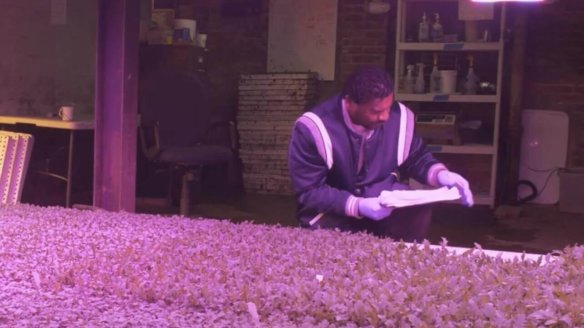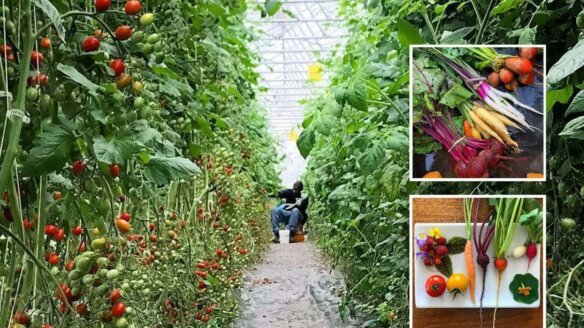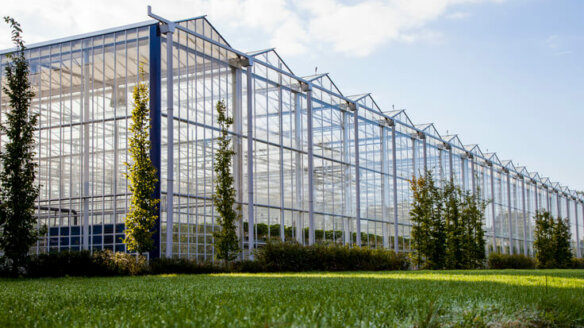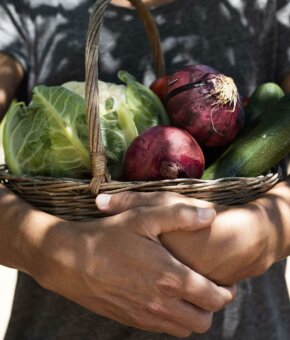
RecoveryPark was formed in 2010 to spearhead community redevelopment based on urban farming, food production and job creation for hard to place workers. At the social and sustainable enterprise, everyone is welcome, including those recovering from addiction or re-entering from the prison system. Contributors to RecoveryPark have helped to showcase Detroit as a potential model for providing local produce to restaurants and the creation of jobs in distressed areas, along with the inclusion of support programs for people with barriers to employment.
Tony Taylor has been working as an associate for RecoveryPark farms for a little over a year. After 33 years in prison, he knocked on the farm’s door. “RecoveryPark was the first job offer I had, and they have been very, very supportive. I have got the job, I have got my own apartment, my own car. And I’m about to get married. It has been pretty smooth and RecoveryPark has helped a lot. Because I am here and I am doing this work, I know that this is a place where I am needed. To witness something beginning to grow and then at the end you see the final product of something that you helped to produce. It is fulfilling.”

Detroit is the home of a unique story
“We had 1.9 million people in 1951 at the height of our population. Today, we are about 630,000, so we have lost two thirds of our population,” says Gary Wozniak, CEO of RecoveryPark. “If agriculture is going to be successful going into the future, you need bodies to staff the greenhouses. So why not bring the growing to the bodies, as opposed to the bodies to the growing?”
In Detroit, once thousands of people worked in its 52 car factories. Now only two factories remain. But the city is not dead yet. Grassroots movements are making an effort to shift from steel and rubber to soil and seeds. Recovery park aims to produce all kinds of fruit and vegetables for the neighborhood on a large scale, and Gary has big ambitions. His goal is to use the local available workforce. Veterans, people recovering from addictions and former prisoners; all are welcome at RecoveryPark.
RecoveryPark is creating an agrihood
“I call it an agrihood, so it is a neighborhood all based on agriculture. Almost all of it is hydroponic. And almost all of it distributed to restaurants within a 300 mile radius around Detroit, and creating close to 300 jobs paying an average of 22 dollars an hour plus benefits”, says Wozniak. “Investors should be encouraged to broaden their scope. Business models like these could solve many problems for expanding cities. If cities start to integrate their greenbelts into urbanised areas, the real estate investors are becoming the growers of tomorrow, solving many social and environmental problems.”

The next step for RecoveryPark: a huge Greenhouse
Soon, RecoveryPark will have more positions to fill. It is currently working on plans to develop a two-acre, 35-foot tall hydroponic greenhouse in another part of the city on Hendrie and Palmer. This development will enable RecoveryPark to go from 200,000 dollars in revenue to 6 million dollars in revenue and from seven employees to thirty employees, Wozniak says. Employees in the hydroponic greenhouse will work year-round.
RecoveryPark has already proven the business model through pilot hydroponics and high-tunnel or soil-based growing operations a couple of blocks away near its headquarters on Chene, Wozniak said. It has contracts to supply lettuce to Detroit wholesale distributor Del Bene Produce that produced 180,000 dollars in revenue last year and are set to do about the same this year.
It is all about hydroponics
The eventual goal is that the hydroponic greenhouse operations will have 60 acres of land under glass and employ up to 300 people in fifteen years. Unlike the traditional greenhouse that involves growing soil-based plants in a controlled environment, hydroponic farming relies solely on water.
Seeds for plants are placed in special floating tray racks that rest in a pond of water filled with nutrients to promote plant growth. These trays are then showered with special lighting from above. The plants are grown in a controlled environment just like in traditional greenhouses.

Changing the way consumers view food
“Our mission is to create jobs for people with barriers to employment: people coming out of prison or drug treatment programs,” Wozniak continued. “Our vision is to do that by creating jobs in the food industry and eventually we will transfer majority ownership to the workforce in those businesses.”
The new greenhouse will also help change the way consumers view food by establishing local, hyper-fresh options and local accountability for the quality of that food, he said.
The Max M. and Marjorie S. Fisher Foundation, which made a 400,000 dollar program-related investment loan to the nonprofit in 2016, is in the process of looking at the conversion terms, said Meredith Freeman, who is serving as interim executive director of the Fisher Foundation while Executive Director Doug Stewart is on sabbatical. Stewart told Crain’s Detroit. “I really applaud them for their commitment not only to the city and the neighborhood but to keeping that social aspect in place around making sure they are employing those who have challenges to employment. They have never let that go. It could have been easier business-wise to let that go, but they made that commitment, stuck to it, and we are really happy to support that.”
Discover sustainable urban deltas: green belts for livable mega cities
If we want to counter the great issues of our time and make mega cities livable, we need to fundamentally change our food and land use system. The good news is, we can. How? By creating ‘Sustainable Urban Deltas’; mega cities that embrace food production in metropolitan areas to create new connections on a social, ecological, and economic level, providing space for energy, social cohesion, property development and climate.
Keen to find out more about RecoveryPark? Watch the video:
RecoveryPark is one of the urban pioneers we feature in our online documentary. Ready for more inspiration? Watch it now, it is free!



